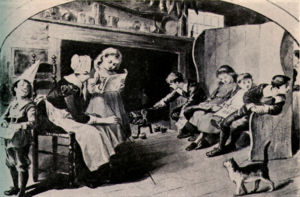- Dame school
-
A Dame School was an early form of a private elementary school in English-speaking countries. They were usually taught by women and were often located in the home of the teacher.
Contents
Britain
Dame schools were quite varied - some functioned primarily as day care facilities, overseen by illiterate women, while others provided their students with a good foundation in the basics. The inadequacies of Dame schools in England were illustrated by a study conducted in 1838 by the Statistical Society of London that found nearly half of all pupils surveyed were only taught spelling, with a negligible number being taught mathematics and grammar. Dame schools became less common in Britain after the introduction of compulsory education in 1870, whereafter schools that were found to be below government-specified standards of tuition could be closed.
North America
In North America, "dame school" is a broad term for a private school with a female teacher during the 17th, 18th, and 19th centuries. The education provided by these schools ranged from basic to exceptional.[1] The basic type of dame school was more common in New England, where basic literacy was expected of all classes, than in the southern colonies, where there were fewer educated women willing to be teachers.[2]
Motivated by the religious needs of Puritan society and their own economic needs, some colonial women in 17th century rural New England opened small, private schools in their homes to teach reading and catechism to young children. An education in reading and religion was required for children by the Massachusetts School Law of 1642. Dame schools fulfilled this requirement if parents were unable to educate their young children in their own home. These women, often widows, received tuition in coin, home industries, alcohol, baked goods, and other valuables. Teaching materials generally included, and often did not exceed, a hornbook, primer, Psalter, and Bible.[3] Girls in dame schools might also learn sewing, embroidery, and other "graces".[4] Most girls received their only formal education from dame schools because of sex-segregated education in common or public schools during the colonial period.[5] If their parents could afford it, after attending a dame school for a rudimentary education in reading, colonial boys moved on to schools where a male teacher taught advanced arithmetic, writing, Latin, and Greek.[6]
In the 18th and 19th centuries, some dame schools offered boys and girls from wealthy families a "polite education". The women running these elite dame schools taught "reading, writing, English, French, arithmetic, and music, and dancing". [7][8]
Australia
The first school in Australia, started in 1789, was a Dame school in which children were taught basics by a convict, Isabella Rossen.
See also
References
- ^ Perlmann, Joel, and Robert Margo. Women's work?: American schoolteachers, 1650-1920. Chicago: University of Chicago Press (2001), 9
- ^ Tolley, Kimberley. Transformations in schooling: historical and comparative perspectives. New York: Macmillan (2007), 91.
- ^ Harper, Elizabeth P. "Dame Schools". In Encyclopedia of Educational Reform and Dissent, Thomas Hunt, Thomas Lasley, and C D. Raisch, 259-260. SAGE Publications (2010).
- ^ Forman-Brunell, Miriam. Girlhood in America: An Encyclopedia. Santa Barbara: ABC-CLIO (2001), 575.
- ^ Moss, Hilary J. Schooling citizens: the struggle for African American education in antebellum America. Chicago: University of Chicago Press (2009), 133.
- ^ Zhboray, Ronald. A fictive people: antebellum economic development and the American reading public. New York: Oxford University Press (1993), 92.
- ^ Greene, Jack and Rosemary Brana-Shute, and Randy J. Sparks, eds. Money, Trade, and Power: The Evolution of Colonial South Carolina's Plantation Society. Columbia, SC: University of South Carolina Press (2001), 305.
- ^ Clinton, Catherine. "Dorothea Dix." In The Reader's companion to American history By, Eric Foner and John Arthur, 289. New York: Houghton Mifflin Harcourt, 1991.
External links
Categories:- History of education
- School types
Wikimedia Foundation. 2010.

